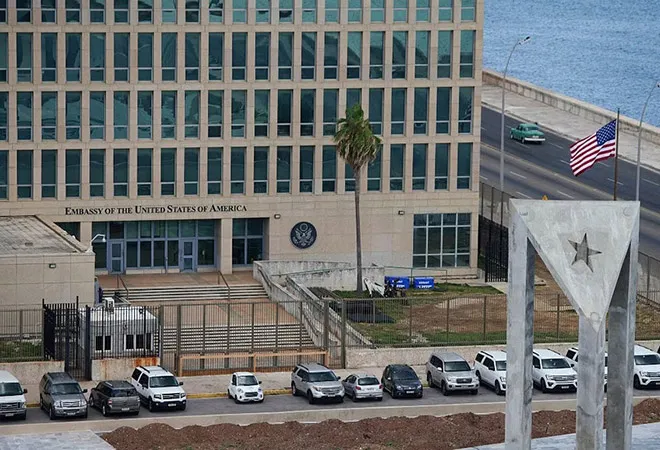-
CENTRES
Progammes & Centres
Location
Beijing hopes expansion in the American backyard will make dominoes fall

Media reports of a pact between China and Cuba to establish a facility on the island barely off the American coast to collect electronic intelligence and keep tabs on maritime activity has emerged as a new challenge to the United States (US) in its backyard. Reports suggest that the snooping facility in Cuba would enable China to spy on communication throughout America’s southeast part, which is home to several military establishments.
The Biden administration’s initial flip-flop on the issue of the Cuban spy base amidst the Secretary of State Antony Blinken’s visit to China for parleys, which seek to stabilise fraught relations, have churned domestic politics. Initially, the White House and Pentagon termed the news reports as inaccurate, but later the Biden administration portrayed the Chinese spy base as a “legacy issue” from the Trump era since the base had been in operation since 2019 and that the development had been discussed during the presidential transition. At a time when there is a bipartisan consensus in the US polity on the issue of China, the Republicans are not pleased with their rivals trying to drive home a point that the Grand Old Party was lax on the national security front. Congressman Mike Gallagher, chairperson of the House Committee on the Communist Party of China (CPC), has assessed the development as a bid by the CPC to alter the “Monroe doctrine into the Mao doctrine”, linking the flip-flops over the Cuban spy base with the recent overtures by the Biden administration to China.
The Biden administration’s initial flip-flop on the issue of the Cuban spy base amidst the Secretary of State Antony Blinken’s visit to China for parleys, which seek to stabilise fraught relations, have churned domestic politics.
The Cuban-Chinese spy station row comes amid speculation of a Sino-US thaw. US Secretary of State Antony Blinken is slated to travel to Beijing and London between 16-21 June. In China, Blinken’s agenda prominently features ways to manage relations with the People’s Republic of China and issues related to bilateral cooperation, which had come to an end since the US spy balloon incident. Gallagher has also posited that China’s spy station in Cuba, and Chinese involvement with governments in the region constituted an important challenge to the American sphere of influence. Naturally, these issues would gain traction as the US heads towards the 2024 presidential elections. However, the controversy comes at a time when there is increased engagement between governments in Central and South America and the People’s Republic.
Honduras, which established formal relations with China in March 2023, became the latest addition in a string of nations to sever diplomatic connections with Taiwan. And for this switch, Beijing pulled out all the stops for the state visit of Xiomara Castro, the first woman President of the Central American nation. Honduras is among the latest Central American nation to hop on to the Belt and Road Initiative (BRI) bandwagon. On 12 June, the two nations inked 19 bilateral cooperation agreements, including one on the joint building of the BRI. Sino-Honduran cooperation will cover fields like farming, economic and trade issues, education, science and technology, and culture. The China-Honduras business session on the sidelines of the Castro visit saw the participation of 200 delegates from both nations. Castro sought admittance to the New Development Bank, which has been promoted by the BRICS grouping, after visiting the financial institution’s headquarters in Shanghai. Significantly, she also visited a facility operated by Chinese telecom major, Huawei. Although the two nations formalised relations in March 2023, their negotiations on a free-trade agreement are near fruition. The pact will make it easy for Honduran products to access the Chinese market, and facilitate Chinese companies to invest in sensitive sectors like infrastructure, energy, and telecommunications. At a time when nations like India and the US have been trying to highlight China’s strategy of entrapping small states through white-elephant projects in infrastructure, Xi Jinping’s signature initiative seems to have received strong endorsement in America’s backyard. Honduran Minister of Economic Development Fredis Cerrato rebutting the “debt trap” narrative, saying that BRI would improve people’s living conditions, is a propaganda coup by Beijing in Washington’s backyard.
At a time when nations like India and the US have been trying to highlight China’s strategy of entrapping small states through white-elephant projects in infrastructure, Xi Jinping’s signature initiative seems to have received strong endorsement in America’s backyard.
The Monroe Doctrine, one of the principal foreign policy tenets espoused by former US President James Monroe, forbade foreign intervention in the Western Hemisphere. It cemented the notion that the region was effectively in the American sphere of influence. America has forcefully intervened in the past to thwart foreign powers from spreading their influence in its backyard in the past. At the height of Cold War 1.0 in the 1960s, Cuba had been at the centre of great power contestation. Shortly after Fidel Castro deposed Cuban dictator Fulgencio Batista and established a Communist beachhead off the American coast in the late 1950s, a Democrat John F Kennedy administration backed an attempt by émigrés to grab power, which was known as the Bay of Pigs incident. The US and the Soviet Union were on the brink of nuclear war after the latter positioned nuclear-capable missiles in Cuba, forcing a naval blockade of the island known as the Cuban Missile Crisis in 1962. In the original Cold War, there was a notion of the ‘domino theory’ that nations neighbouring a state where a communist regime had been installed would quickly fall like dominoes.
Today, we are witnessing a reverse-domino effect in Cold War 2.0, with nations in America’s backyard falling to China’s economic statecraft. According to Beijing’s strategists, Honduras may veritably be the domino in the Americas with respect to China’s inroads in the region. Recently, Argentina and China signed an agreement on promoting BRI, improving cooperation in areas like infrastructure, energy, and trade. Zhou Zhiwei from the Chinese Academy of Social Sciences expressed hope that as BRI makes inroads, other nations in the region like Brazil and Colombia fall like dominoes to China’s juggernaut. Above all the Cuba and Honduras case studies serve as a pointer to the fact that if the US supports Taiwan, then China can make inroads in America’s turf. This is evidenced by Chinese Foreign Minister Qin Gang’s assertion in a recent call with Blinken that the US must respect China’s position on Taiwan and stop undermining its sovereignty.
Zhou Zhiwei from the Chinese Academy of Social Sciences expressed hope that as BRI makes inroads, other nations in the region like Brazil and Colombia fall like dominoes to China’s juggernaut.
Cuba is a major inflection point in both Cold Wars as proxy conflicts are usually fought in countries away from the superpowers. The Soviet Cuban retreat signified its overreach, and now as the CPC has chosen to take the fight to America’s doorstep, all eyes will be on how it goes ahead. Again, in a sensitive political year as the US heads for election, the American electorate will be scrutinising the responses of the past and current Democrat administrations to gauge how they fared on the Monroe metric. In Asia, too, nations will closely follow Blinken’s Beijing sojourn, and how America deals with the dragon rampaging in its backyard to assess its primacy and resolve in taking on the China challenge.
Kalpit A Mankikar is a Fellow with Strategic Studies programme at the Observer Research Foundation
The views expressed above belong to the author(s). ORF research and analyses now available on Telegram! Click here to access our curated content — blogs, longforms and interviews.

Kalpit A Mankikar is a Fellow with Strategic Studies programme and is based out of ORFs Delhi centre. His research focusses on China specifically looking ...
Read More +